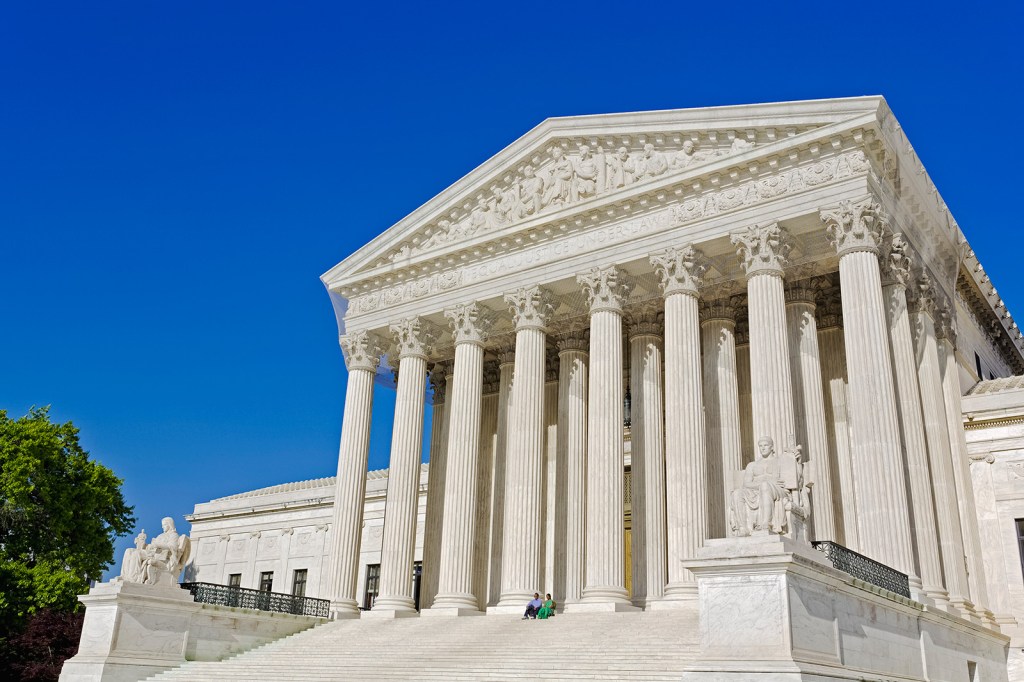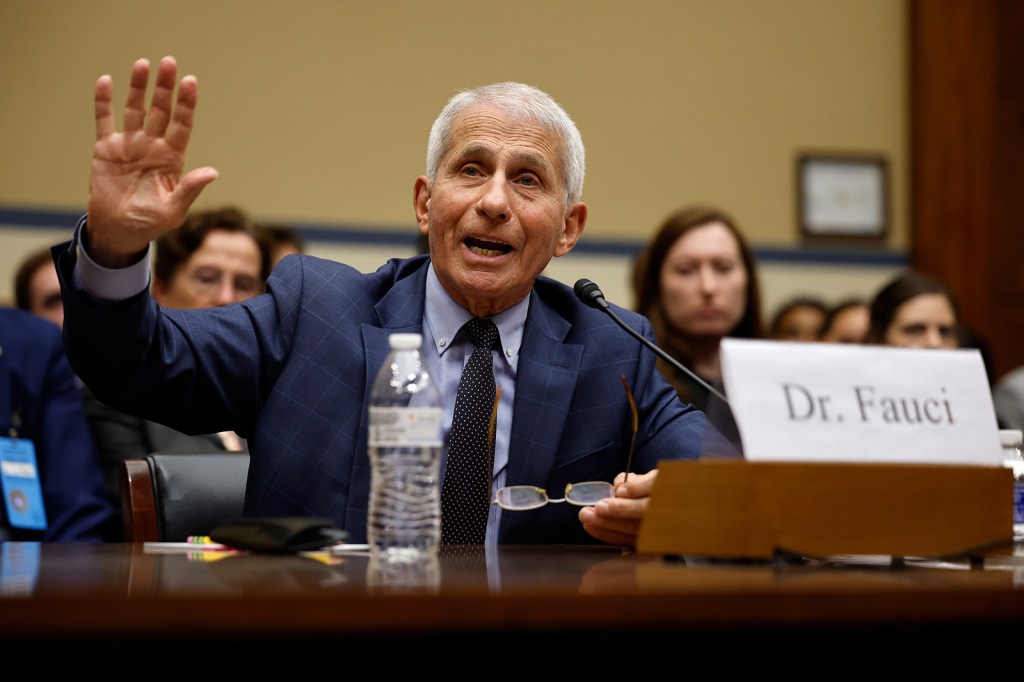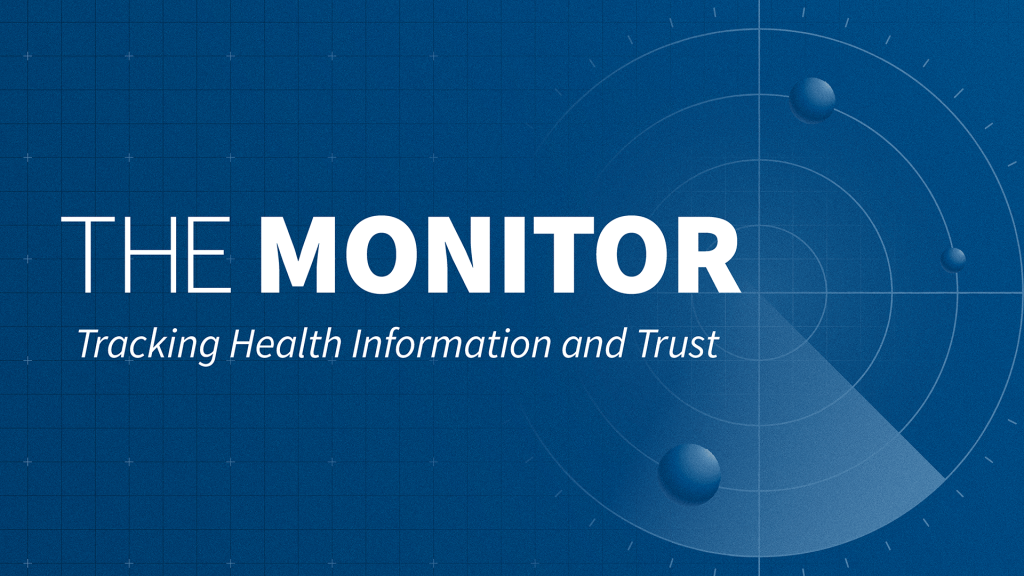VOLUME 2
Supreme Court Cases on Content Moderation and Mifepristone Access
This is Irving Washington and Hagere Yilma. We direct KFF’s Health Misinformation and Trust Initiative and on behalf of all of our colleagues across KFF who work on misinformation and trust we are pleased to bring you this edition of our bi-weekly Monitor.
This issue of the Monitor focuses on recent Supreme Court decisions impacting health misinformation. We examine cases balancing free speech and platform regulation, the Court’s ruling on mifepristone access and public perceptions of social media moderation. We also explore COVID-19 narratives after Dr. Fauci’s congressional testimony and AI developments in predicting misinformation trends during pandemics.
Recent Developments
Mitigating Misinformation on Social Media: Content Moderation versus First Amendment Rights

The Supreme Court will soon rule on three cases that will have significant impact on misinformation and content moderation. These rulings will balance free speech, government influence, and social media companies’ right to moderate content. In Murthy v. Missouri, Missouri and Louisiana, along with private groups, sued the Biden administration, claiming they pressured social media companies to censor conservative viewpoints on topics like COVID-19 and election fraud. The government argued that it only requested, not demanded, the removal of misinformation. In July 2023, a district court issued a temporary injunction halting these communications, and the Fifth Circuit Court of Appeals later agreed, citing potential volitation of the First Amendment. The Supreme Court will now decide whether the states and other defendants in the case had the right to sue, if the government’s actions violated the First Amendment, and if the temporary injunction was appropriate.
The Supreme Court is also considering social media content moderation in two other cases: NetChoice v. Paxton and Moody v. NetChoice. These cases focus on the editorial discretion of social media companies. Both cases question whether 2021 laws in Texas and Florida violate the First Amendment rights of social media companies to make editorial decisions about the publication and distribution of speech. Moody v. NetChoice challenges a Florida law that prevents social media platforms from censoring political candidates and certain journalistic outlets, moderating harmful misinformation and adding labels that direct users to verified information. NetChoice v. Paxton challenges a broader Texas law that prevents popular websites from enforcing viewpoint-based community standards. In both cases, NetChoice sought preliminary injunctions and lower courts initially stopped the laws from taking effect, suggesting they might violate the First Amendment. However, appeals courts later made different decisions in each case. The Court heard arguments in both cases in February and is expected to issue its decisions in late June or early July.
KFF Polling Insights:
The March KFF Health Misinformation Tracking Poll examined public attitudes about content moderation to combat health misinformation on social media. When asked about potential action by the U.S. government to require social media companies to restrict false health information, the poll found the public is somewhat divided. About six in ten adults overall (57%) say, “The U.S. government should require social media companies to take steps to restrict false health information, even if it limits people from freely publishing or accessing information,” while about four in ten (42%) say, “People’s freedom to publish and access health information should be protected, even if it means false information can also be published.” (Figure 1) There is a stark partisan divide, with a majority of Democrats (73%) and independents (60%) supportive of government intervention on this issue. Republicans (38%) are much less likely to say the U.S. government should intervene in this way.
Faulty Science and Misinformation Impacts Knowledge About and Access to Abortion Pills and Contraceptives

Mifepristone, a drug used for safe and effective medication abortion, has faced hurdles due to the spread of false information about its safety. The Alliance for Hippocratic Medicine, a newly-formed group of anti-abortion doctors and organizations sued the FDA in November of 2022, challenging mifepristone’s safety and wider access. Their claims were bolstered by flawed studies that were subsequently discredited. In February, Sage Journals, a publisher of peer-reviewed research, retracted three abortion studies citing methodological problems and conflicts of interest. Researchers around the world then called for the retraction of other flawed studies. The Supreme Court reviewed the case this year, and in June, the Court unanimously dismissed the lawsuit, ruling that the defendants did not have standing to challenge the FDA’s regulatory actions regarding mifepristone. However, the Court’s decision leaves room for future challenges to access and distribution of mifepristone based on safety concerns. A KFF Policy Watch explains the results of the case in more detail. Despite ongoing efforts to debunk false claims about the safety of medication abortion pills, access to these pills is still restricted, as all types of abortion, including medication abortion, is banned in 14 states. Most recently, Louisiana became the first state to classify mifepristone as a controlled substance.
KFF Polling Insights:
Medication abortion accounts for nearly two-thirds of abortion in the US and has been safely used by millions of women since it was approved by the FDA in 2000. The March KFF Health Tracking Poll examined the public’s knowledge and attitudes about medication abortion pills. The poll found that a slim majority (54%) of the public has heard of mifepristone, the medication abortion pill and that the legality and use of the medication continues to be misunderstood across the public.
About four in ten women (43%) are “unsure” whether medication abortion is legal in the state they live in, including 38% of women ages 18-49. Nationally, at least four in ten U.S. adults say they are not sure whether the medication is legal where they live regardless of whether they live in a state where abortion is limited (54% say they are unsure), banned (44%), or available (41%; Figure 2). In addition, about one in eight adults (13%), including a similar share (11%) of women, living in states where abortion is currently banned, incorrectly believe medication abortion is legal in their state (Figure 1). Notably, women without a college degree are more likely than those with a degree to say they are “unsure” about the legality of medication abortion in their state (50% vs. 32%).
Misinformation about reproductive health extends beyond mifepristone, affecting access to various birth control methods such as IUDs and emergency contraceptive pills. A KFF issue brief highlights how these misconceptions about contraceptives can influence legal interpretations under recent Supreme Court decisions and state laws. It also discusses state and federal efforts to protect contraceptive rights, including proposed legislation, state-level constitutional amendments, and executive orders promoting access to contraceptive services. Similarly, a Washington Post article details far-right strategies to limit access to birth control by spreading misinformation. In Missouri, for example, Republicans blocked a bill to expand access to birth control by falsely linking contraceptive pills to abortions.
Misleading Headlines About COVID-19 Guidelines After Fauci’s Testimony

On June 3, 2024, Dr. Anthony Fauci, former director of the National Institute of Allergy and Infectious Diseases, testified before the Select Subcommittee of the House Oversight and Accountability Committee. This was his first public appearance on Capitol Hill since leaving government office. During the hearing, Fauci denied allegations that he influenced research on the origins of the COVID-19 virus and that he used a private email for official business. Prior to the hearing, the Washington Post reported that the Trump administration’s former assistant secretary for mental health and substance use questioned the CDC’s policy of six feet of social distance during the pandemic, claiming that the policy lacked concrete data to support it. After the hearing, misleading headlines continued to appear, suggesting that Fauci had admitted that the COVID-19 guidelines were “made up”. However, fact-checking by Poynter clarified that Fauci’s decisions were based on available data, not controlled trials, and that there are conflicting studies on these guidelines. Poynter also notes that Fauci emphasized the CDC’s role in shaping guidelines based on empirical judgment and past research, rather than personally inventing rules.
Emerging Misinformation Narratives
Debunking COVID-19 Vaccine Misinformation: False Claims About CKM Syndrome

In May, two articles published on conspiracy websites used a 2023 scientific paper on cardiovascular-kidney-metabolic (CKM) syndrome to falsely claim that CKM is caused by COVID-19 vaccines, even though the paper never mentions COVID-19 vaccines. Both articles were shared widely on social media. On May 23, the American Heart Association issued a warning debunking the false claims, stating, “These false articles and accompanying social media posts are misleading and make connections that cannot be attributed to the American Heart Association or its scientific statement…The Association supports COVID-19 vaccinations as safe and effective.”
False and misleading claims linking COVID-19 vaccines to heart problems have been circulating since the vaccines were first developed. The recent false claim that “90 percent of the vaccinated population now suffers from [CKM] caused by the COVID-19 vaccines” appeared in two articles published on the conspiracy websites the People’s Voice and Natural News on May 17 and May 21 respectively. Within days of publication, social media posts about both articles spread across multiple platforms—primarily on X—in English and in Spanish. As of June 14, social media posts about the People’s Voice article garnered 4,900 engagements (likes, comments, and shares), and social media posts about the Natural News article garnered 150 engagements.
The most popular post sharing the People’s Voice article was published on May 20 on X, where it received 1,125 shares and 1,198 likes as of June 14. The majority of comments on the post echoed the post’s false claims that COVID-19 vaccines are dangerous. One comment criticized the post’s false claims noting, “Anyone who thinks so is a flat-earther anti-vaxxer murderer” (quote translated from Spanish). Although the articles prompted the American Heart Association to directly debunk the false claims, social media posts discussing the articles do not represent an abnormally high spike in false claims that COVID-19 vaccines cause heart problems. In fact, the number of social media posts mentioning COVID-19 vaccines and heart problems has remained relatively consistent over the past six months and is currently declining. However, it’s expected that vaccine opponents will continue misrepresenting studies to promote false claims about COVID-19 vaccine safety.
Health Discussions to Watch
COVID-19 Origins and Guidance: Media monitoring and social listening research shows that social media posts about Dr. Fauci skyrocketed across multiple social media platforms following his testimony about the government’s COVID-19 response on June 3rd. In the last 30 days, social media posts spreading false claims about Fauci, COVID-19, and COVID-19 vaccines increased by 426 percent compared to the previous 30 days. Many posts falsely claimed that COVID-19 is a “bioweapon,” that the government covered up the alleged dangers of COVID-19 vaccines, and that Fauci “made up” social distancing guidelines. Some posts criticized committee members for promoting COVID-19 conspiracy theories.
Medication Abortion: Media monitoring research found that news of the Supreme Court’s ruling on mifepristone led to an uptick in social media posts, primarily on Facebook, falsely claiming that mifepristone is unsafe. Politicians were the leading authors of these false claims. One senator wrote, “Mifepristone is a dangerous abortion pill that is harmful to both women and babies.” By June 14, the day after the Court’s decision, the post received 116 reactions and 125 comments. However, most of the comments on the senator’s post criticized or debunked the false claim.
Research Updates
Rethinking the Impact of Misinformation on Social Media
A perspective article in Nature questions common beliefs about online misinformation, explaining that exposure to false content is not as widespread as people think and mainly affects extreme user groups. The article suggests that social media platforms should track exposure in these groups, address the reasons why people want misinformation, share more data with researchers, and do more research globally, especially in areas where there’s not much information. It also criticizes simple explanations that blame social media for big problems, saying that what users want plays a big role. The article ultimately calls for increased research to improve our understanding of the effects of social media.
Source: Budak, C., Nyhan, B., Rothschild, D. M., Thorson, E., & Watts, D. J. (2024). Misunderstanding the harms of online misinformation. Nature, 630(8015), 45-53.
Advertising’s Role in Financing Online Misinformation and Proposed Transparency Interventions
A study examined how online misinformation is funded by advertising, leading to inflated mass shooting statistics and misinformation about firearm-related deaths being attributed to gang or drug violence. The research highlighted the widespread use of advertising on misinformation websites and the negative consumer backlash faced by companies that advertise on such platforms. The study proposed interventions to reduce the funding of online misinformation, including providing advertisers with data on where their ads appear and increasing transparency for consumers about companies advertising on misinformation outlets. These interventions aim to empower consumers and advertisers with information to make informed decisions and could be incorporated into existing legislation to improve transparency in digital advertising.
Source: Ahmad, W., Sen, A., Eesley, C., & Brynjolfsson, E. (2024). Companies inadvertently fund online misinformation despite consumer backlash. Nature, 630(8015), 123-131.
Impact of Misinformation and Vaccine-Skeptical Content on COVID-19 Vaccine Hesitancy in the US
New research examined the impact of misinformation and vaccine-skeptic content on COVID-19 vaccine hesitancy in the United States. The researchers found that while flagged misinformation contributed to lower vaccine intentions when seen, its overall impact was limited due to low exposure rates. On the other hand, vaccine-skeptical content, including articles from credible mainstream sources, had a significantly greater impact on reducing vaccination rates, even though they were not flagged by fact-checkers. The study emphasizes the importance of addressing not only blatant misinformation, but also content that raises questions about vaccines without containing falsehoods, as this can also lead to vaccine refusal.
Source: Allen, J., Watts, D. J., & Rand, D. G. (2024). Quantifying the impact of misinformation and vaccine-skeptical content on Facebook. Science, 384(6699), eadk3451.
AI & Emerging Technologies
AI Technique Links Anti-Vaccine Language on Reddit to Increased COVID Hospitalizations and Deaths

An article in Scientific American discusses a new AI-based technique that has the potential to predict the real-world impact of online health misinformation. Using Reddit as a data source, researchers discovered correlations between language used in anti-vaccine posts and increased COVID hospitalizations and deaths. This analytical framework combines concepts from social psychology, such as “fuzzy trace theory,” with machine learning to measure how language influences behavior. The approach shows potential for predicting health outcomes during pandemics and informing content moderation strategies on social media platforms. However, it may not work as well for studying specific health issues or ephemeral events due to the nature of causal relationships in social media rhetoric.
Support for the Health Information and Trust initiative is provided by the Robert Wood Johnson Foundation (RWJF). The views expressed do not necessarily reflect the views of RWJF and KFF maintains full editorial control over all of its policy analysis, polling, and journalism activities. The Public Good Projects (PGP) provides media monitoring data KFF uses in producing the Monitor.


 Irving Washington
Irving Washington  Hagere Yilma
Hagere Yilma 

